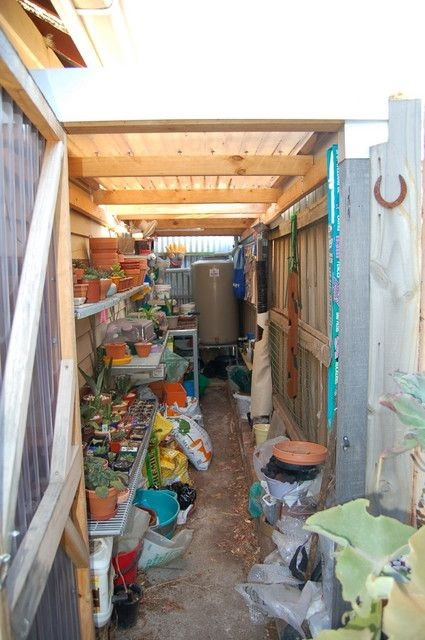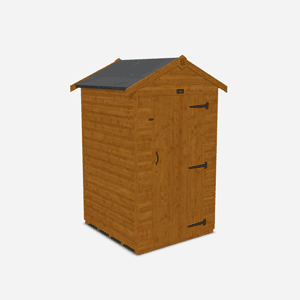How Close Can a Shed Be to a Fence in the UK?
Published: 13/09/2021

At first glance, the issue of shed-boundary distance might seem a simple one – but it’s more complex than it seems. In this post, we deconstruct all the factors that determine – or are determined by – how close a shed can be to a fence in the UK. Let’s take a closer look…
Why the fence matters
As you’re reading this article, it’s clear you understand you can’t just erect your garden building wherever you like – any guide on how to build a shed in the UK would tell you that. In fact, there are both legal and practical factors you must consider:
- Planning permission and your local council
- Neighbours
- Access
- Build-up of damp and mould
Related questions that may be on the tip of your tongue could include:
- Can I build a shed next to my neighbour’s fence?
- My neighbour’s shed is overlooking my garden – what can I do?
- Can my neighbour build a shed against my fence?
We aim to answer all these questions and more below.
A shed and its distance from a fence
As we state earlier in this post, there are both legal and practical factors to consider here…
How close a shed can be to a fence: what UK law says

According to UK shed regulations, you do not need to seek planning permission if your shed is 2.5 metres tall (or less) and sits at least two metres from the boundary of a property – whether a fence or wall [1]. That said, if your property is a listed building (or has a listed building on it), you’ll need to seek planning permission to assemble your shed (no matter the shed height or how close it is to a fence). The need for planning permission can also vary depending on where in the UK you live – sometimes rural areas may have differing rules to city dwellings, for example. To be sure of the rules in your area, contact your local council. So, on the question of whether you can build a shed next to your neighbour’s fence in the UK, the answer is yes – provided you follow certain rules.
Practical considerations
Let’s forget about legal concerns for a minute and consider other reasons why it’s important not to build a shed too close to a property line.
Avoid damp and mould

If your shed – or any type of garden building – is too close to a fence, this will impede the flow of air. In other words, it won’t be able to ‘breathe’. And nor will the fence for that matter! This, in turn, could lead to the build-up damp and mould [2].
Access

If you’re building a shed, you clearly want to be able to get inside! But if your shed is too close to a fence, the door may not open be able to open properly. And this could make it more difficult to manoeuvre cumbersome garden equipment, such as wheelbarrows or lawnmowers, in or out of the building. Placing a shed so that the wall is too close to a fence could also stop you treating it. Why is this important? Because as we say in many other blog posts, and throughout the Tiger Sheds website, treating your garden building helps prolong its life – leaving you with a storage shed, workshop, log cabin or summerhouse to enjoy for many years from now. To ensure you have enough space to treat the outer wall of your shed, we recommend leaving at least 18 inches (approx. 46 centimetres) between the shed and the fence.
Consider your neighbours

It’s important to consider how your neighbours feel (or may feel later) when you build a shed. Here’s an example: Let’s say you’re friendly with your neighbour and they’re happy for you to build your shed as close to their fence as you like (unlikely, but possible). And let's imagine you decide to ignore UK shed regulations and make your shed higher than 2.5 metres and closer than two metres. Now – your current neighbour may be happy with that and not report the issue.
Why you should follow the rules
But what happens if and when they move out and your neighbour objects to the height of your shed and the proximity to their fence? You could get in trouble – and this is why it’s always best to find out what the rules are, and then stick to them. If the neighbour complains to your local council and you are found to have broken any laws, the authorities could make you take down the shed – and even land you with a heavy fine. Obviously, this works both ways. So, if your neighbour has built - or is planning to build a shed - against your fence, you may have a right to object and/or complain to your local council.
Can the council make me take down my shed?
Yes - if your shed contravenes any local planning laws, your council can order you to take down your shed. If you refuse to do so, you can be prosecuted (see reference 3).
My neighbour’s shed is overlooking my garden – what can I do?
If the neighbour’s shed is overlooking your garden, but the structure doesn’t count as a planning breach, then all you can do is try to reason with them. However, if you believe the outbuilding contravenes planning rules, you can contact your local authority. The UK government’s Planning Portal is a good source of information on this topic [3].
References
[1] https://www.planningportal.co.uk/info/200130/common_projects/43/outbuildings [2] https://www.theguardian.com/lifeandstyle/2008/mar/01/diy.homes8 [3] https://www.planningportal.co.uk/info/200127/planning/103/having_your_say/5








